|
|
|
Sort Order |
|
|
|
Items / Page
|
|
|
|
|
|
|
| Srl | Item |
| 1 |
ID:
159867
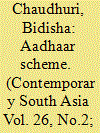

|
|
|
|
|
| Summary/Abstract |
The burgeoning influence of liberal market economy coupled with a ‘good governance’ paradigm across post-communist and post-colonial states emphasizes a market concept of equality, while turning ‘citizens’ into ‘customers’. This trend has been further accentuated by the massive inlets of Information Communication Technologies into governance mechanisms having a significant impact on the ways of governmentality and thereby on the substance and processes of documenting citizenship. It is in this wider context of intersecting economic and political changes that this paper captures the shifting regimes of citizenship in India as manifested through the processes of Unique Identification, or Aadhaar scheme, an initiative by the Government of India that seeks to give every Indian resident a unique identity documentation. Although Aadhaar does not authenticate citizen identity, nonetheless, in its promise to build a ‘national grid’ of identity information infrastructure, it indicates a meta-structure of a new inclusion/exclusion paradigm of citizen formation in India that appears to reinvent early liberal values of civic republicanism based on property rights. Rather than assessing the merits of this scheme, this paper demonstrates how new technologies of governmentality could impact the citizenship regime in India while keeping with the demands of a growing neo-liberal political economy.
|
|
|
|
|
|
|
|
|
|
|
|
|
|
|
|
| 2 |
ID:
141776
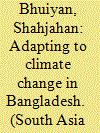

|
|
|
|
|
| Summary/Abstract |
Climate change poses a serious threat to humanity in developed and developing countries and is already affecting South Asia. This study examines the role that good governance plays for adapting to climate change in Bangladesh, arguing that lack of good governance in Bangladesh risks reducing adaptation preparedness to climate change in the country. There is evidence, mainly because of geophysical risk factors, to support arguments that good governance has anyway limited capacity in relation to adaptation measures to climate change in countries like Bangladesh. The article argues that the current politico-economic situation makes it doubtful whether Bangladesh will achieve the fullest possible ability to ensure good governance for better adaptation to climate change in the near future.
|
|
|
|
|
|
|
|
|
|
|
|
|
|
|
|
| 3 |
ID:
131222
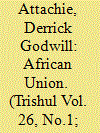

|
|
|
| 4 |
ID:
079898
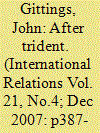

|
|
|
|
|
| Publication |
2007.
|
| Summary/Abstract |
The British government decision on `Trident renewal' forms part of a much wider rebuff to the non-proliferation and peace agenda. The Nuclear Non-Proliferation Treaty risks being discredited at its next review in 2010; new nuclear powers are setting the pace for others; another `war' is being threatened which will last `for generations'. There has been no post-Cold War peace dividend, and the chance to make up for lost time has been missed. War, not peace, is once again seen as the universal default mode.
It is now clear that traditional arguments in favour of peace and nuclear disarmament are never going to succeed. The view that one `cannot predict the unpredictable', used to justify the Trident decision, will always result in decisions being reached on a worst-case scenario. New arguments need to be developed with a broader appeal based not only on strategic calculation but on a compelling alternative world view.
Looking both forward and back into history we have to rediscover peace, not war, as humanity's central concern. Just as the test of the good ruler in ancient China was to maintain peace within the four corners of the kingdom, so today modern states have a shared obligation to exercise good governance across the globe. The effort to reshape our common goals will require a sustained exercise in the re-education of elites, and the mobilisation of multitudes
|
|
|
|
|
|
|
|
|
|
|
|
|
|
|
|
| 5 |
ID:
058084
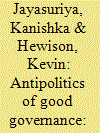

|
|
|
| 6 |
ID:
118939
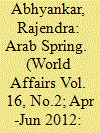

|
|
|
| 7 |
ID:
133485
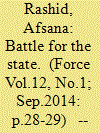

|
|
|
|
|
| Publication |
2014.
|
| Summary/Abstract |
With the State Assembly elections round the corner, mainstream political parties and separatists here are gearing up with their respective agendas. Many new political equations and alliances are expected to come to the fore in the upcoming polls, in Jammu and Kashmir, slated at the end of this year.
The contest will be close for several stalwarts and many new faces will emerge on the political horizon of the state. Though bijli, pani and sadak (electricity, water and roads) will remain the main focus of the election manifesto of several political parties, resolution of Kashmir issue, abrogation of Article 370 (that provides special status to the state of Jammu and Kashmir) and rehabilitation for Kashmiri Pandits will find equal importance on their respective agendas. Prof. Farooq Fayaz, a prominent historian, author and director Academic Staff College, University of Kashmir, observes that apart from focusing on good governance, all political parties have their own roadmaps to follow
|
|
|
|
|
|
|
|
|
|
|
|
|
|
|
|
| 8 |
ID:
115865
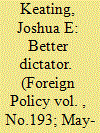

|
|
|
| 9 |
ID:
137768
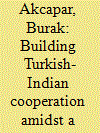

|
|
|
| 10 |
ID:
120928
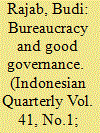

|
|
|
| 11 |
ID:
102411
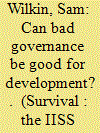

|
|
|
|
|
| Publication |
2011.
|
| Summary/Abstract |
That good governance is necessary for economic development was until recently the conventional wisdom. In 2002, for example, a USAID study asserted that 'without good governance, it is impossible to foster development'. The Economist's Africa editor, Robert Guest, wrote in 2004 that 'Africa's wars spring mostly from bad government … Bad governance is also the main reason why Africa is so poor.' Even Milton Friedman, a champion of market liberalisation, later endorsed the good-governance paradigm: 'I was wrong. It turns out that the rule of law is probably more basic [to development] than privatization.'
|
|
|
|
|
|
|
|
|
|
|
|
|
|
|
|
| 12 |
ID:
160458
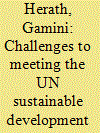

|
|
|
|
|
| Summary/Abstract |
In 2015, the UN proposed the Sustainable Development Goals; they were accepted by 193 countries. Sri Lanka faces many challenges in implementing the SDGs. The lack of reliable and recent data is a serious issue. Another issue is the weak institutional capacity of Sri Lanka, which has led to poor governance and policy incoherence. There is no strong political will, and interministerial conflicts are rampant. Unless these issues are properly addressed, the yahapalanaya (good governance) government of President Sirisena may not contribute well to achieve the SDGs by 2030.
|
|
|
|
|
|
|
|
|
|
|
|
|
|
|
|
| 13 |
ID:
174778
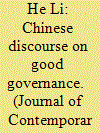

|
|
|
|
|
| Summary/Abstract |
Since Xi Jinping came to power in 2012, governance reform and innovation have become a central pillar of China’s grand strategy. Meanwhile, the debate on good governance gained momentum among the Chinese intellectuals ranging from the proponents of good governance, New Leftists, liberals, champions of political meritocracy, and advocates of the Singapore model. This study uses content analysis to examine the works by leading Chinese scholars and other primary materials. This study finds that the Chinese intellectual discourse on governance is a double-edged sword. It has generated some important theoretical rendering and practical designs of the governance reforms that the Party-state could cherry-pick., Yet, the enhanced governance capacity could help the regime build up legitimacy without convergence to liberal democracy.
|
|
|
|
|
|
|
|
|
|
|
|
|
|
|
|
| 14 |
ID:
091244
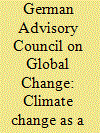

|
|
|
|
|
| Publication |
London, Earthscan, 2008.
|
| Description |
xviii, 248p.
|
| Standard Number |
9781844077618
|
|
|
|
|
|
|
|
|
|
|
|
Copies: C:1/I:0,R:0,Q:0
Circulation
| Accession# | Call# | Current Location | Status | Policy | Location |
| 054369 | 355.95160943/GER 054369 | Main | On Shelf | General | |
|
|
|
|
| 15 |
ID:
068145
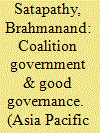

|
|
|
| 16 |
ID:
119427


|
|
|
|
|
| Publication |
2013.
|
| Summary/Abstract |
Although the role of intelligence services has been addressed in many recent discussions of the democratization process, yet it has not yet generally been pursued sufficiently by academics and politicians. 1 Mongolia and its intelligence services have been among those countries undergoing a democratic transition and consolidation process. Mongolia is the only formerly Communist Asian state whose democratization process has not regressed. In fact, since 1990, electoral democracy has become the "only game in town," where space for a vibrant civil society exists, and the security institutions have remained outside of the political and economic contests. 2 Approval in early 2012 of the law on conflicts of interest, a set of laws concerning the judiciary, revisions of the election law, and a sustained public demand for good governance are signs of a healthy nascent democracy, one which admittedly still has room for improvement. 3 Unique in the region, Mongolia's security organizations-the military, intelligence agencies, and police-have remained mostly outside of this political transformation. The role of these security institutions in the quest for democratization has often been ignored because of a misperception about their roles and centrality, and the reality of the Soviet military presence in Mongolia during the Cold War.
|
|
|
|
|
|
|
|
|
|
|
|
|
|
|
|
| 17 |
ID:
165383
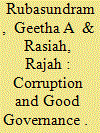

|
|
|
|
|
| Summary/Abstract |
Since its formation in 1967, the Association of Southeast Asian Nations (ASEAN) has progressed to become an economic powerhouse. From a loosely formed grouping in the 1960s, its members have since undergone massive integration. A key motive of the Association is to transfer government and public services onto a technology platform, termed e-government. An important concern is whether e-governance can reduce corruption and stimulate sustainable development. Using traditional governance measures and e-governance indices, this paper analyses the state of governance and corruption in ASEAN. While the deepening of e-governance — via government and public participation — has raised the potential for improving good governance practices, that in itself can be counterproductive as socioeconomic agents could broaden corrupt practices by appropriating its public-good-like characteristics. Hence, ASEAN governments have to implement changes in their communications strategies and feedback mechanisms, remove barriers blocking the spread and use of information technology, and promote a collaborative environment with civil society organizations, while considering the use of the “carrot and stick” approach to improve good governance.
|
|
|
|
|
|
|
|
|
|
|
|
|
|
|
|
| 18 |
ID:
109959
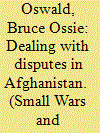

|
|
|
|
|
| Publication |
2012.
|
| Summary/Abstract |
This article addresses the principles that should guide commanders, and the rules they must adhere to, when dealing with community disputes in Afghanistan. An important feature of these principles and rules is that they have been developed to ensure that coalition forces minimize the harm caused to the local population; and that members of the coalition do not violate their own laws and policies. The principles and rules have also been developed to be consistent with counterinsurgency guidance as practiced in Afghanistan. The article concludes with a number of 'Dos and Don'ts' concerning dispute settlement that are relevant for coalition forces dealing with disputes at the tactical level. The article also has two appendices, which are intended to guide commanders to better understand dispute settlement systems in Afghanistan.
|
|
|
|
|
|
|
|
|
|
|
|
|
|
|
|
| 19 |
ID:
119440
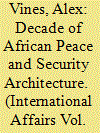

|
|
|
|
|
| Publication |
2013.
|
| Summary/Abstract |
This article examines how the African Union (AU) has handled Africa's peace and security challenges since 2002, defines what has been successful and what remains aspirational. It does so by examining how the AU has responded, from using sanctions against coups, to deploying peacekeeping missions and mediating in conflicts.
An African Peace and Security Architecture (APSA) has developed since 2002, including a Peace and Security Council, an African Standby Force, a Continental Early Warning System and a Panel of the Wise. This sounds impressive, but the operationalization record is patchy: AU-deployed missions have been fully dependent on external donors; harmonization is a major problem; serious questions remain over AU capacity; and some of the Regional Economic Communities (RECs) are developing at a quicker pace than the AU.
Given these circumstances and its internal capacity deficit, the AU will likely struggle to exercise oversight of regional processes, including the development of regional standby force arrangements. APSA is clearly based on a liberal peace model, yet democratic systems, respect for human rights and good governance aren't always in place in African countries, and the self-interest of elites continues to be a constraint on APSA and its success.
Over the last decade the AU has found a voice and, despite some setbacks, it has shown through AMISOM in Somalia that it is capable of conducting a successful peacemaking operation. Its biggest challenge is not making the decision to intervene or deploy forces, but the capacity of most African states to deploy effectively. APSA's dependence on external partners needs to diminish over the next decade if better African solutions are to be found to peace and security challenges in the continent. Yet, the internationalized nature of crises such as the one in Mali in 2012-13 requires international partnerships.
Not all of Africa's security problems can be solved by Africa alone, but APSA does provide a vision framework for African and external partnership.
|
|
|
|
|
|
|
|
|
|
|
|
|
|
|
|
| 20 |
ID:
095314
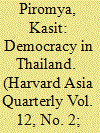

|
|
|
|
|
| Publication |
2009.
|
| Summary/Abstract |
According to Thailand's foreign minister Kasit Piromya, democracy in Thailand is going through some growing pains. It is hardly a struggle between democracy and dictatorship, nor one of the rural masses against the urban elite. Instead, it is one of patronage versus good governance-a struggle between old style patronage politics, ironically being led by former democratically-elected Prime Minister Thaksin Shinawatra, against the growing push for a democratic system guided by the moral compass of inclusiveness, transparency, accountability, good governance and the rule of law.
|
|
|
|
|
|
|
|
|
|
|
|
|
|
|
|
|
|
|
|
|